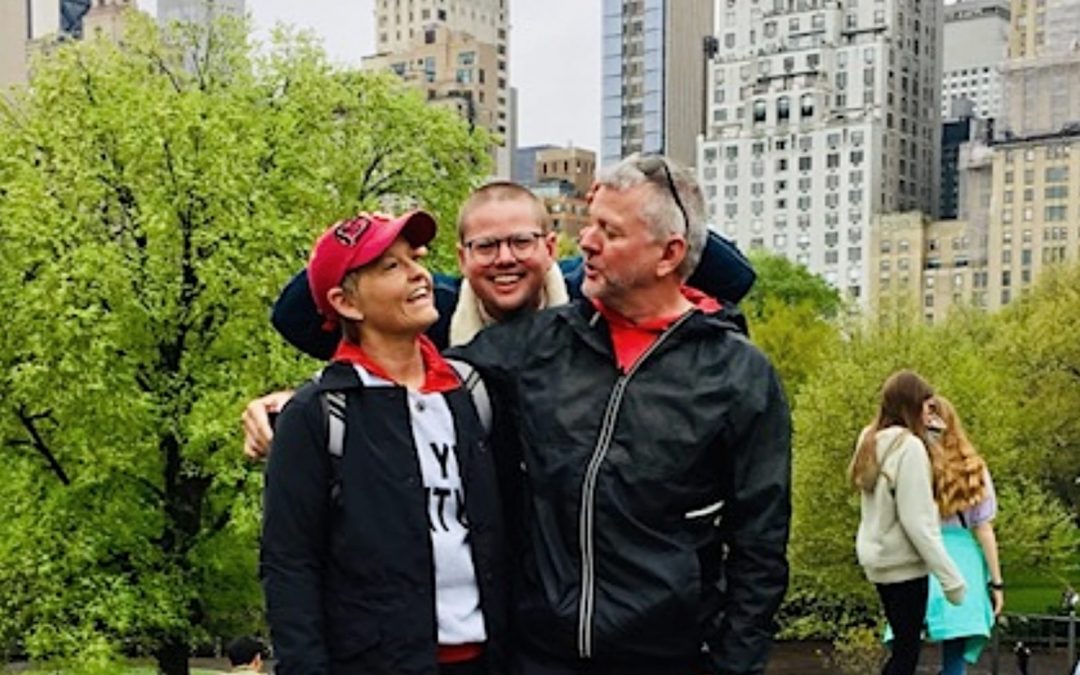“I am so sorry.” “We will pray for you.” “We are all sinners.” “It’s just a phase.” These are a few responses we heard regularly.
Our “favorite” comment from a family member was, “If you hang out with cowboys, you want to be a cowboy,” which we think means he has a lot of friends who are also gay.
But the most popular is, “Hate the sin but love the sinner.”
What we needed to hear from our spiritual leaders, family and friends: “Your child is fearfully and wonderfully made.” “I will love him as Christ loves him.” and “Because he claims Christ as his Savior, he is welcome in our church.”
When our 21-year-old son courageously announced to us that he was gay, he did so without truly knowing how we would react.
He was raised in Southern Baptist churches and heard from the pulpit, youth worship leaders, friends and, sadly, even his parents that homosexuality was a sin.
He was very familiar with the six verses against homosexuality. Our son used a related video presentation by Matthew Vines addressing these six verses to his home church, as his way of communicating his belief that his orientation was not condemned.
In the end, it came down to either you believe homosexuality is a choice or you believe it is innate.
We knew our son was made unique to God’s plan and not condemned. Although he is a sinner just as we are, it is not his homosexuality or our heterosexuality that qualifies us a sinner.
We are so thankful that our son took the risk of trusting that his parents would love their child without reservation.
We counsel other parents that you get very few opportunities to demonstrate to a child the unconditional love that our heavenly Father grants to us.
After our son announced to us, he graciously allowed us time to prepare ourselves to defend him before announcing to our family and friends inside and outside the church.
We were relieved he was affirmed by our immediate family, intimate Christian friendships and our secular friends.
Our greatest disappointment was the response of the church.
Soon after our son came out to us, we emailed the senior pastor of our large, evangelical, contemporary church for guidance.
He passed our email over to an associate pastor who replied that because we were already members, we were welcome to remain with the church with the condition that they would be “ministering” to Jeremy.
No phone call, no face to face, no shared prayer. Only a conditional email.
The event that provided the greatest insight was a women’s Bible study group at the same church.
The discussion centered on another church member’s family Christmas card that included their gay son and his partner in the family picture.
The general comments were, “How could they send this card with them in the picture?” The offense was to the receiver of the card and not the struggle of the senders of the card.
We were still in the early stages with our new family “secret” and realized this group of “friends” and Christian leaders could never be a safe place for our family.
There is so much truth to the adage, “Be careful who you hate, it may just be someone you love.”
We experienced similar responses from the majority of churches we visited. As parents, we were welcomed to join as members, but our Christian homosexual son could not.
Our greatest fear was to bring our son to a church only to be condemned in a sermon.
We felt we were alone in this search and began to wonder if we were one of the few Christian families who could not find a church home.
Fortunately, we found a Facebook group that was 500 members strong of Christian moms of Christian LGBTQ+ children. The love shared in this group is amazing and safe.
We found other families who faced the same struggles and desired affirming Christian support. Every family story is different, but unfortunately there were a few commonalities.
The majority of the families that suffered the most rejection were in the same southern Protestant denomination.
The other similarity is that children had rejected their faith, even though they were accepted by their families.
These children were raised in the church. They attended every service, went on every youth group trip and lock-in and responded to every call to missionary work. The church was the center of their development.
The rejection of the church felt like the rejection of God. The principles of grace, mercy, acceptance and redemption appear to stop at the announcement of orientation.
Christian parents want an affirming church home not just for themselves, but also to re-engage their LGBTQ+ children who are walking away from the faith.
It wasn’t until we attended NorthHaven Church in Norman, Oklahoma, and met Mitch and Missy Randall, that we saw an inclusive and affirming church.
We are proud servants of God who are blessed with a unique child. We have never lost sight or belief in Christ’s love and mercy.
Although we still believe in the necessity of a church community, we hurt that our son continues to hear denominational church leaders and conventions condemn his orientation regardless of belief in Christ.
Our son still believes in Christ, but it is unfortunate that his argument and evidence against church affirmation is greater than our ability to highlight churches where there is affirmation and the growing trend toward acceptance.
Editor’s note: This article is part of a weeklong series. Other articles in the series are:
Crossing Chasm That Seemingly Divides Bible, LGBTQ Loved Ones by Preston Clegg


